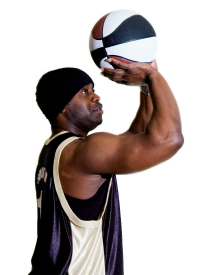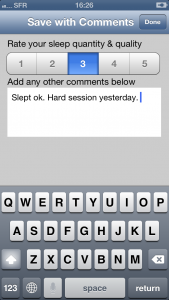Sleep & Recovery
 Recovery is essential in any training programme and sleep is arguably the most important element of recovery.
Recovery is essential in any training programme and sleep is arguably the most important element of recovery.
As most athletes know you don’t get fitter during workouts but actually when your body recovers, rebuilding and super compensating to get stronger and fitter. This is known as functional overreaching. Research suggests that deep (slow wave) sleep is the time when the growth hormone is released. Muscle growth and repair, bone building and fat burning are all stimulated by the growth hormone so sustaining high levels is particularly important for athlete recovery. Slow wave sleep is also associated with strong parasympathetic activity and therefore high HRV.
Sleep deprivation also imbalances many hormone levels, particularly those relating to stress, muscle recovery and mood. One such hormone is cortisol – also known as the stress hormone – which has a significant effect on the body’s ability to both perform and recover. This can quickly become a vicious cycle as elevated cortisol is known to disrupt sleep, preventing the body from reaching deep sleep as often as normal.
Sleep & Performance
 Whilst research is still somewhat lacking in this area it is widely accepted that sleep deprivation negatively effects performance – both mental and physical.
Whilst research is still somewhat lacking in this area it is widely accepted that sleep deprivation negatively effects performance – both mental and physical.
One particularly interesting study by Mah et al. (2011) showed that when basketball players sleep was extended by a couple of hours per night over a 6 week time period performance was significantly improved. At the end of this study shooting accuracy had improved (free throw percentage increasing by 9% and 3-point field goal percentage by 9.2%), sprint times reduced and athletes reported improved overall physical and mental well-being.
Getting your recommended hours has also been linked to mental performance and the ability to learn new skills, particularly important for athletes in training, and ratings of perceived exertion.
Sleep Debt
Whilst one or two disrupted nights are unlikely to have a noticeable impact on performance the concept of sleep debt is extremely important for athletes. Frequently suffering from little or disrupted sleep is linked to performance decline and reduced ability to learn, adapt and improve. Sleep deprivation also negatively affects both the immune and endocrine systems. Sleep debt is the difference between the amount of sleep you need and the amount you actually get. Regular disruption or loss, even a few hours here and there, quickly adds up to a debt which it can be very difficult to make up.
Tracking Sleep
Every individual is different and the amount of sleep you need will vary from person to person. Monitoring the hours and quality is a simple but very effective way to begin understanding how much your body needs.
 The impact of sleep on recovery, and HRV, is discussed above but to truly understand the relationship we recommend recording a sleep score each morning with your ithlete HRV measurement. Over time you will begin to see trends and be able to adjust behaviour accordingly. For example do you need more sleep to achieve good HRV recovery at different points in a training programme or season? Do you need more rest after travelling? Are you prone to a poor night’s sleep after a particularly intense training session and what could you do to combat this? Recording and tracking with ithlete is a great way to begin understanding these patterns!
The impact of sleep on recovery, and HRV, is discussed above but to truly understand the relationship we recommend recording a sleep score each morning with your ithlete HRV measurement. Over time you will begin to see trends and be able to adjust behaviour accordingly. For example do you need more sleep to achieve good HRV recovery at different points in a training programme or season? Do you need more rest after travelling? Are you prone to a poor night’s sleep after a particularly intense training session and what could you do to combat this? Recording and tracking with ithlete is a great way to begin understanding these patterns!
Are you already recording your sleep score with ithlete? If so we’d love to hear your observations and comments!
In a later post in this series we’ll look at recommendations for getting a good night’s rest plus how to work out how much sleep you need.

The graphical representation of HRV is helpful but would be even more beneficial if you would couple the “sleep quantity & quality” response. It would create an easier way to recognize sleep pattern and HRV correlations through heavy weeks of training.
Thanks,
Nick
Hi Nick,
Thanks for sharing your thoughts! We recommend using the 5 point sleep scale to reflect both quantity and quality. What we’re looking to do in the future is expand how you can review patterns and trends of this too.
Keep feedback coming, it’s always appreciated!
Thanks,
Laura
Is the sleep score only part of iphone/ipad? Is it available in android?
Hi William,
Yes, sleep score recording is available on Android too. After taking a morning reading simply select ‘Save with Comments’ and the pop up to enter sleep score and any comments will appear.
Hope that helps,
Laura